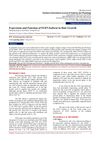 26 citations,
October 2007 in “Experimental Dermatology”
26 citations,
October 2007 in “Experimental Dermatology” L-Carnitine-L-tartrate may help hair grow and prevent hair loss.
23 citations,
July 1993 in “The journal of investigative dermatology/Journal of investigative dermatology” Certain chemicals and peptides can promote hair growth or prevent baldness.
 19 citations,
January 1997 in “Endocrinology”
19 citations,
January 1997 in “Endocrinology” Testosterone can slow hair growth in adult monkeys, but a blocker called RU 58841 can counteract this and potentially help hair regrow.
 4 citations,
October 2009 in “Skin research and technology”
4 citations,
October 2009 in “Skin research and technology” Colorimetry can accurately measure hair growth rates in mice.
 3 citations,
June 2021 in “PLOS ONE”
3 citations,
June 2021 in “PLOS ONE” A topical BRAF inhibitor, vemurafenib, can speed up wound healing and promote hair growth, especially in diabetic patients.
 3 citations,
December 2016 in “KSBB Journal”
3 citations,
December 2016 in “KSBB Journal” The herbal medicine promotes hair growth and could be an effective treatment.
 2 citations,
January 2002 in “The Journal of Korean Medicine Ophthalmology and Otolaryngology and Dermatology”
2 citations,
January 2002 in “The Journal of Korean Medicine Ophthalmology and Otolaryngology and Dermatology” Sophora flavescens extract helps hair grow and prevents acne.
 April 2022 in “Biomedicine & Pharmacotherapy”
April 2022 in “Biomedicine & Pharmacotherapy” CXCL12 protein slows down hair growth through its receptor CXCR4. Blocking this can potentially increase hair growth.
April 2023 in “Journal of Investigative Dermatology” AL136131.3 slows hair growth by affecting energy processes in hair loss.
 51 citations,
May 2011 in “Phytotherapy Research”
51 citations,
May 2011 in “Phytotherapy Research” Ginseng, especially red ginseng, may help regrow hair and block a hair loss-related enzyme.
 28 citations,
March 1942 in “Journal of Endocrinology”
28 citations,
March 1942 in “Journal of Endocrinology” Male rats grow hair faster than females, and certain hormones can slow or slightly increase hair growth, but not significantly beyond natural rates.
 1 citations,
September 2022 in “Journal of The American Academy of Dermatology”
1 citations,
September 2022 in “Journal of The American Academy of Dermatology” Baricitinib helps grow eyebrows and eyelashes in severe alopecia areata patients.
 April 2012 in “KSBB Journal”
April 2012 in “KSBB Journal” Minoxidil analogs can be improved for hair growth inhibition by modifying specific parts of their structure.
May 2024 in “Pharmacia/Farmaciâ” Purple sweet potato leaf extracts can help treat hair loss and fungal infections.
 October 2018 in “Vestnik dermatologii i venerologii”
October 2018 in “Vestnik dermatologii i venerologii” Certain growth factors affect hair loss in women and could be targeted for treatment.
 November 2020 in “Journal of The American Academy of Dermatology”
November 2020 in “Journal of The American Academy of Dermatology” Oral JAK inhibitors help regrow hair in alopecia patients.
 65 citations,
April 2002 in “Journal of Alternative and Complementary Medicine”
65 citations,
April 2002 in “Journal of Alternative and Complementary Medicine” Plant extracts effectively reduce hair loss and increase growth, offering a safe alternative treatment.
 60 citations,
October 2005 in “Experimental Dermatology”
60 citations,
October 2005 in “Experimental Dermatology” Zinc can both inhibit and stimulate mouse hair growth, and might help recover hair after chemotherapy.
 33 citations,
February 2016 in “Journal of Experimental Botany”
33 citations,
February 2016 in “Journal of Experimental Botany” ROOT HAIR SPECIFIC 10 (RHS10) reduces the length of root hairs in Arabidopsis plants.
 2 citations,
January 2019 in “Annals of Dermatology”
2 citations,
January 2019 in “Annals of Dermatology” Melandrium firmum extract helps mice grow hair by blocking a hair loss enzyme and changing hair growth genes.
1 citations,
January 2014 Biochanin A promotes hair growth in mice with testosterone-induced hair loss.
 February 2024 in “Journal of medicinal food”
February 2024 in “Journal of medicinal food” The research found a way to develop hair growth materials by targeting a specific signaling pathway.
 January 2018 in “Figshare”
January 2018 in “Figshare” Curcuma aeruginosa extract lotion effectively reduces underarm hair growth.
 January 2017 in “Korean Journal of Pharmacognosy”
January 2017 in “Korean Journal of Pharmacognosy” Modified red ginseng extract promotes hair growth and has antioxidant and anti-inflammatory effects.
 46 citations,
October 1999 in “Journal of The American Academy of Dermatology”
46 citations,
October 1999 in “Journal of The American Academy of Dermatology” Finasteride effectively treats male pattern hair loss with a 1 mg daily dose.
 13 citations,
February 2022 in “JAMA Dermatology”
13 citations,
February 2022 in “JAMA Dermatology” Dutasteride is the most effective hair loss treatment after 24 weeks, but finasteride leads to the most hair growth after 48 weeks.
 1 citations,
April 2021 in “The journal of investigative dermatology/Journal of investigative dermatology”
1 citations,
April 2021 in “The journal of investigative dermatology/Journal of investigative dermatology” mTORC1 activity is important for hair growth and color, and targeting it could help treat hair loss and greying.
 1 citations,
February 2021 in “Scholars international journal of anatomy and physiology”
1 citations,
February 2021 in “Scholars international journal of anatomy and physiology” Different forms of FGF5 either promote or inhibit hair growth.

Tofacitinib helped a woman with total-body hair loss grow her hair back.
 January 2023 in “Theranostics”
January 2023 in “Theranostics” A patch with curcumin-zinc can improve hair growth and health by delivering beneficial particles to the skin, increasing hair follicles, and reversing effects of a hair loss hormone.


























